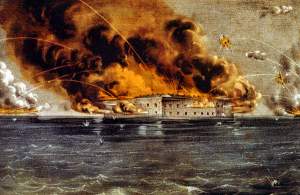Fort Sumter (Murrin, 1999)
Textbook
[Lincoln] finally hit upon a solution that evidenced that mastery would mark his presidency. He decided to send in unarmed ships with supplies but to hold troops and warships outside the harbor with authorization to go into action only if the Confederates used force to stop the supply ships. And he would notify South Carolina officials in advance of his intention. This was a stroke of genius. It shifted the decision for war or peace to Jefferson Davis. In effect, Lincoln flipped a coin and said to Davis: "Heads I win; tails you lose." If Confederate troops fired on the supply ships, the South would stand convicted of starting a war by attacking "a mission of humanity" bringing "food for hungry men." If Davis allowed the supplies to go in peacefully, the U.S. flag would continue to fly over Fort Sumter....Davis did not hesitate. He ordered General Beauregard to compel Sumter's surrender before the supply ships got there....After a 33-hour bombardment in which the rebels fired 4,000 rounds and the skeleton gun crews in the garrison replied with 1,000 - with no one killed on either side - the burning fort lowered the U.S. flag in surrender.
John M. Murrin, et al., eds., Liberty Equality Power: A History of the American People, 2nd ed., vol. 1 (Fort Worth: Harcourt Brace, 1999), 512-513.




























